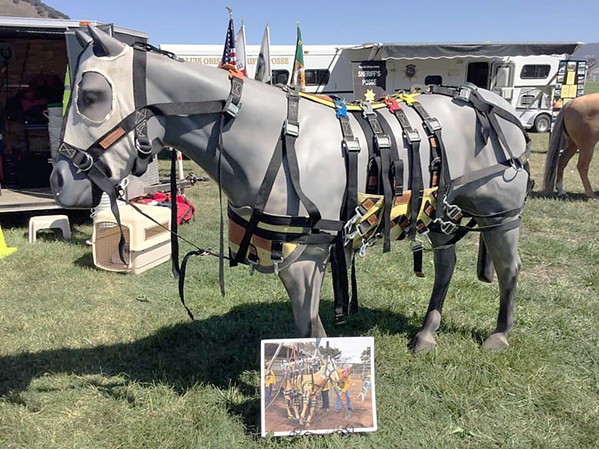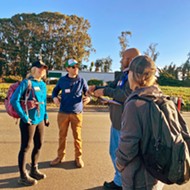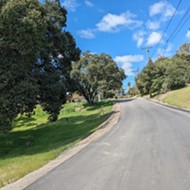The SLO Horse Emergency Evacuation Team works to save animals during disasters
By Adrian Vincent Rosas[{
"name": "Newsletter Promo",
"id": "NewsletterPromo",
"class": "inlineCenter",
"insertPoint": "4",
"component": "15264767",
"requiredCountToDisplay": "0"
},{
"name": "Ad - Medium Rectangle CC01 - 300x250",
"id": "AdMediumRectangleCC01300x250",
"class": "inlineCenter",
"insertPoint": "8",
"component": "2963441",
"requiredCountToDisplay": "12"
},{
"name": "Ad - Medium Rectangle LC01 - 300x250",
"id": "AdMediumRectangleCC01300x250",
"class": "inlineCenter",
"insertPoint": "18",
"component": "2963441",
"requiredCountToDisplay": "22"
},{
"name": "Ad - Medium Rectangle LC09 - 300x250",
"id": "AdMediumRectangleLC09300x250",
"class": "inlineCenter",
"insertPoint": "28",
"component": "3252660",
"requiredCountToDisplay": "32"
}]
Susan McElhinney has a rather unusual side gig.
"[Our group] is a local all-volunteer organization founded to aid the evacuation of large animals in case of disaster," she said. "My role is dispatcher, so I take calls from people who need help with their animals, set up teams for evacuations, and keep track of our teams during incidents."
It's an organization that was born out of necessity, according to the longtime San Luis Obispo County resident, and it's also one—now more than ever—that she considers invaluable to residents.
According to McElhinney, the SLO Horse Emergency Evacuation Team (HEET) has worked for almost 20 years to provide a resource for rural residents to ensure the safety of their large animals during disasters such as flooding or fire.
"HEET was founded in 2003 by a small group of horse owners after the Highway 41 fire in 2002 when it became clear there was no formal plan in place for the evacuation of large animals," she said.
McElhinney said that HEET has worked since then to provide the equipment, know-how, and people to help evacuate large animals like horses and cattle during disasters.
"Our primary focus has been on wildfires and the displacement they cause," she said. "But we have also assisted in rescuing loose livestock from roadways, helped with large animals trapped in ditches, overturned horse trailers, and even assisted in removing animals from neglect situations under the direction of Animal Services."
She noted that the team also makes an effort to have alternative equipment for smaller livestock, as sometimes they also get caught in the panic of a rescue effort.
"Although our focus is large animals, we are also prepared to bring small animals out of danger with us," she said. "We carry a variety of animal crates with us for that purpose."
According to McElhinney, sometimes the issue is as simple as herding the animal(s) into a trailer, and other times large environmental obstacles like fallen trees or unsafe ground require collaboration with local agencies like Cal Fire or other SLO County emergency responders.
"Trailer accidents typically happen when horse show season begins in spring, or when people are taking trips with their horses in the summer," she said. "[But] loose horses can happen anytime at all, 24 hours a day."
McElhinney said that HEET often finds itself called to action during wildfires in late fall and early winter, which means right now she and the rest of the team are preparing for the busy season.
"The amount of evacuations we have per year is variable," she said. "Cal Fire has done a fabulous job of responding quickly and effectively to wildfires, so we fortunately had very few evacuations this year so far."
But it's not just wildfires HEET has to take into consideration when preparing for these evacuation scenarios.
"We have some callouts for mud-related rescues, as wet weather often leads to fence failures, which in turn leads to loose animals that need to be rescued," McElhinney said. "We usually like to advise owners on how to keep their property and livestock as safe as possible, both from the wet weather and the extensive plant growth that follows it."
That advice is another critical part of not just making the efforts of HEET more efficient and effective during rescue situations, but also ensuring there are people in the county who know how to keep their large animal friends safe.
"Our group is trying to get back to monthly training," McElhinney said. "[Our core team] trains regularly on trailering skills, horse handling skills, first aid for people and horses, use of radios, and other related skills."
She credits groups like Cal Fire, the SLO County Fire Chiefs Association, the SLO County Sheriff's Office, and the California Highway Patrol with being instrumental in implementing training programs in the past. With all of these groups contributing resources, HEET members have been trained in programs including the Incident Command System, fire safety, and Red Cross Disaster Services, McElhinney said.
She noted that none of the rescue or training efforts HEET undergoes would be possible without a community across SLO County that's willing to work alongside them.
"We attend neighborhood meetings and other groups to give them information on how to be better prepared for fires, emergencies, and evacuations," McElhinney said. "We also maintain a database of animals that might need rescuing in neighborhoods."
Whether it's rescuing a horse trapped by a fire or saving a cow from a mudslide-wrecked hill, HEET members aim to give residents the most help they can—something that is only possible if the animal owners train their livestock and prepare as much as the organization does.
"If you own a horse, please, please train it to get into any trailer you ask it to or hire a trainer to train it," McElhinney said. "The worst situation is when we try to evacuate a horse that simply refuses to get into the trailer. We have to protect our responders, so in a fire evacuation, each team has a time limit to lead and leave."
She invited locals to visit the HEET website to get involved, whether as a volunteer or through donations, education, and connecting with like-minded residents.
"We have a variety of information on our website as to what our needs are and how people like you can help," she said. "Money is, of course, always useful in helping us get the resources we need, but more importantly so are the talents and skills of our community." Δ
Reach Staff Writer Adrian Vincent Rosas at [email protected].
Latest in News
Readers also liked…
-

Coast Unified teachers upset over new position's salary and qualifications
Oct 20, 2022 -

SLO police identify alleged driver who hit and killed couple
Dec 22, 2022 -

When the levee breaks: Oceano residents, county officials walk a tightrope of regulations to manage Arroyo Grande Creek, which some say led to the levee's failure in January
May 18, 2023











